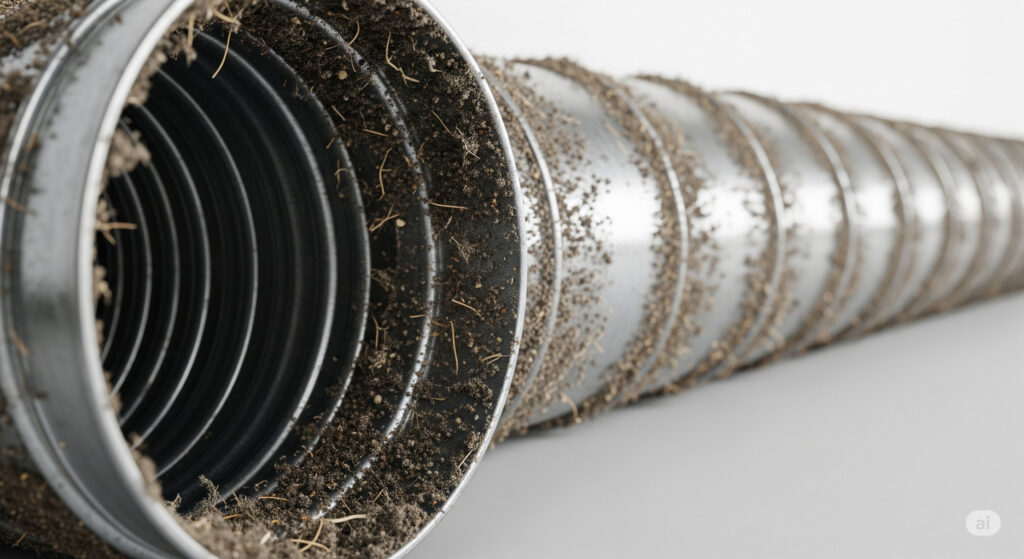The air inside your home can be 2-5 times more polluted than outside air, and sometimes it’s up to 100 times worse. This fact alone makes learning about air duct cleaning valuable to many homeowners. The U.S. Department of Energy’s reports show that homeowners waste 25-40% of energy used to heat or cool their homes. A well-maintained HVAC system, including clean ducts, can lower energy bills by 20-30%. Clean ducts don’t just improve air quality – they remove allergens, get rid of odors, help your system run better, and might even make your equipment last longer.
This piece will get into the importance of duct cleaning, the right time to do it, and how you can make smart choices about your home’s air quality and efficiency.

What is air duct cleaning and why it matters
Your home’s HVAC system works just like your body’s respiratory system. It breathes in and out air all day long. You need to know about air duct cleaning to keep your home healthy.
Understanding HVAC and duct systems
HVAC (Heating, Ventilation, and Air Conditioning) systems use a network of ducts to move air around. The system has two main parts: supply ducts that push heated or cooled air into rooms, and return ducts that pull air back for reconditioning. Your system moves air through your home 5 to 7 times every day. This gives plenty of chances for dirt and debris to build up in your ductwork.
The right ductwork design is vital because poor design can make your system inefficient and break down early. Your furnaces and air conditioners need specific airflow measurements (CFM – Cubic Feet Per Minute) to work their best.

Common contaminants found in ducts
Your ductwork collects many types of pollutants over time:
- Dust, dirt, and debris – Regular daily activities create particles that get sucked into your HVAC system
- Biological contaminants – Mold, mildew, bacteria, and pollen that can cause breathing problems
- Pet dander and allergens – Animal fur and skin cells that often trigger allergic reactions
- Construction debris – This shows up especially after home improvements or in new houses
These contaminants don’t just sit there. They move through your home many times each day. People with breathing issues, auto-immune disorders, or allergies can feel much worse from this constant exposure.
How ducts impact indoor air circulation
Air ducts act as your home’s main air highways and affect both comfort and health. Good ducts keep air pressure balanced in each room—this helps control temperature and air quality better.
Leaky ducts can by a lot hurt your indoor air quality. Studies show that these leaks waste energy and reduce how well your ventilation works, especially in rooms far from the air handler. On top of that, leaks let contaminants bypass filters. This creates random air flows that can spread pollutants all through your home.
Clean air ducts do more than just remove visible dirt. They create a healthier space by fixing the hidden system that affects every breath you take at home.
Key benefits of getting your air ducts cleaned
Your home systems need regular maintenance, and your air ducts need extra care. Clean ducts do more than just look good – they make your home better and healthier.
Improved indoor air quality
Clean ductwork helps create a healthier indoor environment. Your HVAC system works like your home’s lungs, and air moves through your ductwork 5 to 7 times each day. This process lets contaminants build up and affects the air you breathe. The air inside your home can be 2-5 times dirtier than outside air, and sometimes it’s 100 times worse. A professional duct cleaning removes built-up dust, allergens, and other pollutants from your system. This gives you fresher air throughout your home.
Reduction in allergens and respiratory triggers
Clean ducts give much relief to people with breathing problems. Dust mites live in greater numbers inside than outside, and they’re one of the most common triggers for year-round allergies and asthma. Your ducts can trap pet dander, pollen, mold spores, and other things that make breathing difficult. A proper duct cleaning removes these irritants from your system. This can ease allergy symptoms and create a healthier space to live, which helps people with weak immune systems.
Energy efficiency and lower utility bills
A clean HVAC system runs better and saves you money. The U.S. Department of Energy says people waste 25 to 40 percent of their heating and cooling energy. Dust and debris block airflow and make your system work harder to keep temperatures right. Clean ducts let air flow freely through your home. Your system uses less energy and could cut monthly bills by 20-30 percent. These savings add up quickly.
Extended HVAC system lifespan
Clean ducts reduce stress on your heating and cooling equipment. Dust builds up without proper care and forces parts to work harder, which wears them out too soon. Regular cleaning prevents this strain and lets your system run as it should for longer. Clean ducts help you avoid repairs that get pricey and keep your system running at its best throughout its life. Taking care of your system now costs nowhere near as much as fixing major problems later.

When duct cleaning becomes necessary
Your duct system might just need immediate attention even with regular home maintenance. You can prevent health issues and HVAC damage by spotting these warning signs early.
Visible mold or mildew in ducts
Mold in your ductwork poses serious health risks that you need to address quickly. The EPA states that substantial visible mold growth inside hard surface ducts clearly shows the need for cleaning. Black, green, or white spots around your vents indicate that mold has started growing. Note that mold often grows in hidden areas—your only warning might be musty odors that get stronger when your system runs. The mold will simply return after cleaning if you don’t deal with the moisture problems first.
Unusual odors or dust buildup
Your vents might release unpleasant smells that signal the need for professional help. Musty, vinegary odors usually point to mold or mildew growth. A rotten egg smell could mean you have a natural gas leak or dead pests. You might also notice excessive dust despite regular cleaning. Visible dust clouds from vents when your system starts up show that your ducts need cleaning. These problems affect your comfort and could harm your respiratory health.
Signs of vermin or insect infestation
Pests in your ductwork create dangerous contamination. You might hear scratching sounds in walls at night. Look for droppings that look like tiny black rice grains (mice) or coffee grounds (cockroaches), along with ammonia-like smells. Rodents can spread diseases like Hantavirus through their waste, which gets spread throughout your home by air ducts. A flashlight check might reveal chewed materials, torn ductwork, or dark streaks.
Recent renovations or construction debris
Home renovation projects create much dust and debris that ends up in your duct system. Construction work produces sawdust, drywall dust, and other particles that quickly spread through your ventilation network, especially if your HVAC ran during the project. These materials can trigger allergies and breathing problems while reducing your system’s efficiency. A post-renovation duct cleaning removes dust and trapped chemical odors from paints and finishes.

How to choose a reliable duct cleaning service
Choosing the right professional to clean your air ducts will give you quality service and the best results. A good cleaning job versus a poor one can affect both your health and your wallet.
What certifications and standards to look for
Your first step should be checking if the company is a member of the National Air Duct Cleaners Association (NADCA). This organization sets industry best practices and quality standards that member companies must follow. NADCA-certified companies need at least one Air System Cleaning Specialist (ASCS) on their team. This specialist must pass a tough certification exam that shows deep knowledge of HVAC design and cleaning methods.
Keep in mind that while EPA guidelines matter, the EPA doesn’t set duct cleaning standards or certify companies. On top of that, good service providers might have certification from the Institute of Inspection Cleaning and Restoration Certification (IICRC).
Questions to ask before hiring
Talk to several contractors and get written estimates after in-home inspections. Here are the key questions you should ask:
- “How long has your company been in business?” This shows their experience and stability.
- “Can you provide proof of liability insurance?” This keeps you protected if accidents happen during cleaning.
- “What cleaning method and equipment do you use?” Good cleaning needs the whole system under negative pressure with truck-mounted equipment.
- “Will you clean the entire HVAC system including furnace and air conditioner?” Some cleaners only work on parts of the system.
- “Can I see before and after photos of your work?” This gives you the full picture.
Red flags to avoid in service providers
Watch out for these warning signs that might point to scams or poor service:
- Ads for “whole house specials” at surprisingly low prices (like $99)
- Companies that just need full payment upfront
- Missing company names in ads or generic names you can’t find online
- Sales tactics that push you to decide right away
- Companies that find “unexpected problems” that make the price shoot up
- No proper credentials or can’t show proof of insurance
Quality duct cleaning is an investment in your home’s health and efficiency. The right service provider will help you get all the benefits of duct cleaning without any hassles or extra costs.
Conclusion
Clean air ducts provide benefits way beyond the reach and influence of what you can see. This piece gets into how proper duct maintenance affects your health and home efficiency by a lot. Getting the timing right to clean your ducts is a vital decision you’ll need to make as a homeowner.
Your family’s wellbeing depends on the quality of indoor air. A healthier living space comes from removing built-up dust, allergens, and possible biological contaminants. This makes a huge difference for people with respiratory conditions or allergies. On top of that, a clean HVAC system runs better and can cut your energy costs by 20-30%.
The EPA doesn’t suggest regular cleaning without specific reasons. You should take action right away if you notice visible mold, strange smells that won’t go away, too much dust, signs of pests, or recent construction work. These situations make the cost of proper cleaning worth it.
Finding the right service provider matters just as much. You’ll want to check for NADCA certification and ask detailed questions about their methods and track record. Watch out for prices that seem too good to be true or aggressive sales tactics. The right choice will give you quality service with all the benefits you’re looking for.
Your home’s air quality needs the same care as other maintenance tasks. We spend about 90% of our time inside, breathing air that moves through these systems. Clean ducts are an investment in your property’s value and your family’s health and comfort that will last for years.

